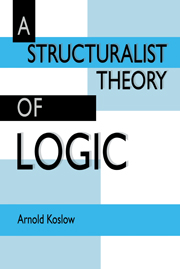Book contents
- Frontmatter
- Contents
- Preface
- Part I Background
- Part II Implication relations
- Part III The logical operators
- 11 Hypotheticals
- 12 Negations
- 13 Conjunctions
- 14 The disjunction operator
- 15 The logical operators parameterized
- 16 Further features of the operators
- 17 The dual of negation: Classical and nonclassical implication structures
- 18 The distinctness and relative power of the logical operators
- 19 Extensionality
- 20 Quantification
- 21 Identity
- 22 Special structures I: Logical operators on individuals: Mereology reconstituted
- 23 Special structures II: Interrogatives and implication relations
- 24 Completeness
- Part IV The modal operators
- Appendix A An implication relation for the integers in the programming language BASIC
- Appendix B Symmetric sequents as products of implication relations and their duals
- Appendix C Component-style logical operators and relevance
- Notes
- Bibliography
- Index
- Frontmatter
- Contents
- Preface
- Part I Background
- Part II Implication relations
- Part III The logical operators
- 11 Hypotheticals
- 12 Negations
- 13 Conjunctions
- 14 The disjunction operator
- 15 The logical operators parameterized
- 16 Further features of the operators
- 17 The dual of negation: Classical and nonclassical implication structures
- 18 The distinctness and relative power of the logical operators
- 19 Extensionality
- 20 Quantification
- 21 Identity
- 22 Special structures I: Logical operators on individuals: Mereology reconstituted
- 23 Special structures II: Interrogatives and implication relations
- 24 Completeness
- Part IV The modal operators
- Appendix A An implication relation for the integers in the programming language BASIC
- Appendix B Symmetric sequents as products of implication relations and their duals
- Appendix C Component-style logical operators and relevance
- Notes
- Bibliography
- Index
Summary
Constant features of varied structures
Throughout the preceding chapters we have, from time to time, remarked that certain implications, A1, …, An ⇒ B, do not hold in all implication structures, and that other implications do. For example, we noted that in any structure I = 〈S, ⇒〉 in which NN(A) exists for A in S, one always has A ⇒ NN(A). However, there are structures that have members that are not implied by their double negation. We also noted that there are certain quantificational implications, such as Ui(P) ⇒*N*(EiN*(P)) [Theorem 20.26, the counterpart of “ ‘(∀x)Px → ¬(∃x)¬Px’ is a theorem”], that hold in all extended implication structures in which the relevant operators have values. On the other hand, we saw that N*(EiN*(P)) ⇒*Ui(P) [the counterpart of “ ‘¬(∃x)¬Px ⇒ (∀x)Px’ is a theorem”] does not hold in all extended implication structures (Exercise 20.5).
Thus, some results hold in all implication structures (when the relevant negations, hypothetical, and quantifications exist), and some do not. We noted in passing that, in general, it was the “intuitionistic” results that held in all implication structures, and it was the “classical” ones that held in all the classical structures.
We shall now provide a more precise description of this situation and sketch a proof of it. We do have to be careful in the description of what holds in all structures.
- Type
- Chapter
- Information
- A Structuralist Theory of Logic , pp. 229 - 236Publisher: Cambridge University PressPrint publication year: 1992



